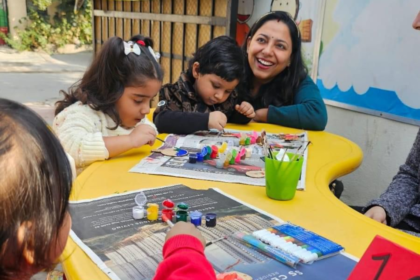
Succeeding in Preschool Teacher Placements and Nursery Training Programmes. Early childhood education teacher placements and nursery training courses create a strong foundation for the future development of influential early childhood educator. In these formative years, forming the lives of the youngest students is just as important as learning the fundamentals of school. To help prospective teachers succeed, this blog post will discuss the value of nursery training programmes and the invaluable experiences obtained from preschool teaching placements.
Role of Nursery Training Course
Nursery training courses are crucial for anyone interested in a career in early childhood teaching. These courses are designed specifically to equip instructors with the knowledge and skills necessary to give young children a caring and stimulating environment. These courses are significant for the following reasons:
- Basic Foundation of Educational Thoughts: Teachers enrolled in nursery training courses are introduced to a range of educational concepts as well as teaching strategies tailored to the needs of young children. With a firm grasp of concepts like Reggio Emilia, Waldorf, and Montessori, teachers can create more successful, child-centred learning environments that promote natural curiosity and learning.
- Comprehending Developmental Psychology: These courses provide educators with knowledge of the psychological aspects of early childhood development. This encompasses the cognitive, emotional, and physical development phases of children from birth to age five. Creating educational activities that promote holistic development requires a deep grasp of these stages.
- Effective Classroom Management Techniques: Managing a group of noisy toddlers in a classroom requires specific techniques. Nursery training classes include practical strategies for managing a range of behaviours, fostering a positive learning environment, and effectively integrating young children into educational pursuits.
- Curriculum Planning: Future teachers can learn how to design engaging and educational curricula in these sessions. This entails choosing educationally sound materials, planning exercises that correspond to various developmental stages, and combining fun learning with academic objectives.
The Importance of Preschool Teacher Placements
Preschool teacher placements provide a hands-on approach to early childhood education, enabling educators to apply their skills in real-world situations, while nursery training courses establish the foundation. These placements offer the following advantages.
- Real-World Experience: Practical experience is the best teacher. Preschool teacher assignments provide aspiring educators with hands-on experience in educating young children by immersing them in the daily operations of early childhood education centres.
- Opportunities for Mentorship: Throughout their assignments, aspiring teachers collaborate closely with seasoned educators who act as mentors. With the help of this priceless mentorship, novice educators can pick the brains of seasoned pros, receive feedback on their pedagogy, and modify their plans in response to immediate observations and recommendations.
- Learning about Classroom Dynamics: Since each classroom is distinct, trainee teachers acquire the ability to adjust to various classroom environments during their placements. They witness directly how to deal with diverse dynamics, coordinate disparate learning styles, and create a welcoming atmosphere that serves every child.
- Cultivating Confidence: Trainees gain confidence in their skills by actively engaging in the instructional process. Their preparation for future positions as independent educators will be greatly aided by this experience. Additionally, for insights into the benefits of early education, consider reading our article ‘Top 12 Reasons Why Your Child Should Attend Pre-nursery School.
How to Overcome Challenges in Training and Placement
Being a preschool teacher has many obstacles, but it’s also a rewarding career path. Here are some pointers for navigating these:
- Remain Open-Minded and Flexible: The field of early childhood education is ever-evolving, and what works for one group of students may not work for another. Keep an open mind and be flexible in your teaching strategies so that you can learn from every experience.
- Prioritize Ongoing Education: The field of early childhood education is always changing. Continue your professional development, even after your courses and internships are over. By doing this, you’ll stay current on the newest methods and trends in education.
- Establish Strong Relationships: Throughout your assignments, give special attention to establishing trusting bonds with parents, kids, mentors, and other educators. Throughout your teaching career, these connections may offer opportunities and assistance.
- Regularly review your training and placement experiences by reflecting on your experiences. You can better grasp what works and what doesn’t in your teaching tactics by reflecting on them.
The first steps to a rewarding career in early childhood education include enrolling in a nursery training course and navigating preschool teacher placements. These experiences give aspiring teachers the confidence to influence young learners’ educational journeys, in addition to providing them with the required skills. Preschool instructors are in high demand, so those who invest in high-quality training and take advantage of their placements will stand out as educators who genuinely impact children’s lives. Thus, embrace every placement as a chance to learn, progress, and ultimately succeed in the field of early childhood education as you embark on your training with great enthusiasm.
FAQs
Which course is best for a nursery teacher?
The NTT course equips candidates with the knowledge and abilities needed to teach children in a contemporary classroom setting between the ages of three and five. Aspiring educators can enter the nursery/preschool teaching field after completing the course.
What is the yearly cost of nursery teacher training?
The NTT training fees are usually within the range of Rs 5,000-25,000 for a year.
What is the meaning of a nursery course?
For children ages three to five, the nursery class—also known as preschool or kindergarten—serves as an early childhood education setting. It serves as a beginning to formal education, setting the stage for further learning and development.





